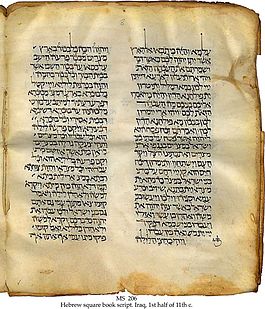
Back الكتاب المقدس والعبودية Arabic Esclavitud en la Biblia Spanish کتاب مقدس و بردهداری Persian Bible et esclavage French עבדות בתנ"ך HE Библия и рабство Russian Pang-aalipin sa Bibliya Tagalog
| Part of a series on the |
| Bible |
|---|
 |
|
Outline of Bible-related topics |
| Part of a series on |
| Forced labour and slavery |
|---|
 |


The Bible contains many references to slavery, which was a common practice in antiquity. Biblical texts outline sources and the legal status of slaves, economic roles of slavery, types of slavery, and debt slavery, which thoroughly explain the institution of slavery in Israel in antiquity.[1] The Bible stipulates the treatment of slaves, especially in the Old Testament.[2][3][4] There are also references to slavery in the New Testament.[5][6]
Many of the patriarchs portrayed in the Bible were from the upper echelons of society, owned slaves, enslaved those in debt to them, bought their fellow citizens' daughters as concubines, and consistently enslaved foreign men to work on their fields.[7] Masters were usually men, but the Bible portrays upper-class women from Sarah to Esther and Judith with their enslaved maids,[8][9][10] as do the Elephantine papyri in the 400s BC.[7]
It was necessary for those who owned slaves, especially in large numbers, to be wealthy because the masters had to pay taxes for Jewish and non-Jewish slaves because they were considered part of the family unit. Slaves were seen as an important part of the family's reputation, especially in Hellenistic and Roman times, and slave companions for a woman were seen as a manifestation and protection of a woman's honor.[7] As time progressed, domestic slavery became more prominent, and domestic slaves, usually working as an assistant to the wife of the patriarch, allowed larger houses to run more smoothly and efficiently.[7]
- ^ Tsai, Daisy Yulin (2014). Human Rights in Deuteronomy: With Special Focus on Slave Laws. BZAW. Vol. 464. De Gruyter. ISBN 978-3-11-036320-3.
- ^ Exodus 21:2–6
- ^ Leviticus 25:39–55
- ^ Deuteronomy 15:12–18
- ^ Ephesians 6:5
- ^ 1 Timothy 6:1
- ^ a b c d Cite error: The named reference
:1was invoked but never defined (see the help page). - ^ Genesis 16:1
- ^ Esther 15:2
- ^ Judith 16:23